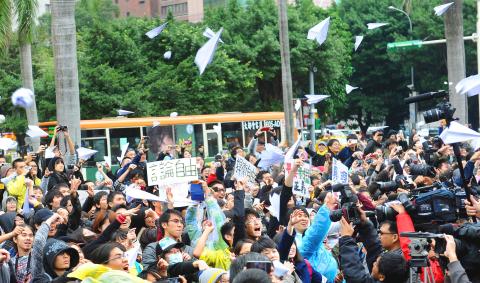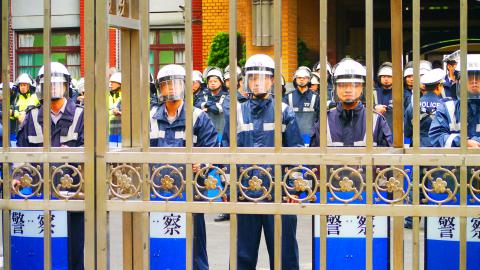Hundreds of young Taiwanese from around the nation yesterday continued to put pressure on the government to act against media monopolization and reject the sale of the Next Media Group’s (壹傳媒集團) Taiwanese businesses to two consortiums with a six-hour protest outside the Joint Government Office Building, where officials from the Fair Trade Commission (FTC) and academics were holding a public hearing on the sale.
Next Media Group signed an agreement on Tuesday to sell its four Taiwanese businesses — the Chinese-language Apple Daily, Next Magazine, Sharp Daily and Next TV — for NT$17.5 billion (US$600 million) to two consortiums comprised of Chinatrust Charity Foundation (中信慈善基金會) chairman Jeffrey Koo Jr (辜仲諒), Formosa Plastics Group (台塑集團) chairman William Wong (王文淵), Want Want China Times Group (旺旺中時集團) chairman Tsai Eng-meng (蔡衍明), Lung Yen Life Service Corp (龍巖集團) chairman David Lee (李世聰) and Taiwan Fire & Marine Insurance Co (台灣產物保險) chairman Steve Lee (李泰宏).
The sale has raised fears of a media monopoly and undue influence from China on Taiwan’s media, in light of the investors’ major business operations across the Taiwan Strait. Critics of Tsai, Taiwan’s wealthiest person, who made his fortune in China, have accused him of interfering with editorial matters at his other media outlets.

Photo: Chang Chia-ming, Taipei Times
For some of the protesters, the journey to Taipei began as early as 3:30am yesterday, as they boarded buses and headed for the capital to express their concerns about the deal.
A large delegation from the south was welcomed by loud cheers as it joined other participants outside the building, which was locked down under heavy security and barbed wire.
Police officers asked for the ID of anyone seeking to enter the building.

Photo: J. Michael Cole, Taipei Times
In all, about 500 people, mostly university students, braved the damp weather as the meeting began at 9am. According to the organizers, the participants came from 36 universities nationwide.
Some had already taken part in two protests in front of the Executive Yuan earlier this week organized by the student group Youth Alliance Against Media Monsters, which also helped organize a much larger protest on Sept. 1 against the planned acquisition by Tsai of the cable TV services operated by China Network Systems (CNS, 中嘉網路).
In a display of fraternity, representatives from each academic institution were invited up on stage to display banners or placards with the name of their school inscribed on them and they were greeted by huge applause.
As student leaders and academics addressed the young crowd, it soon became clear that few had high expectations that the FTC, along with the National Communications Commission (NCC), the Investment Commission and the Financial Supervisory Commission (FSC) — the agencies that are to review the acquisition — would do a thorough job.
Alliance convener Lin Fei-fan (林飛帆) said the demonstrators were asking the FTC to investigate the issue of horizontal and vertical media integration that would be caused by the deal, and to hold a legally binding hearing so that the review procedures would be transparent.
They are also demanding that the legislature enact an anti-media monopoly law as soon as possible, Lin said.
“We will give the FTC two weeks to prepare for and hold a hearing, and we demand that it reject the deal in a month,” Lin told the protesters.
Chen Wei-ting (陳為廷), one of the student leaders, said the students had two serious concerns — that a media monopoly is taking shape while the government remains clueless and fails to deal with the issue, and the growing influence of China on Taiwanese media.
Representative from civic groups also voiced their concerns about the deal, with Taiwan Democracy Watch saying in a statement that the government should do whatever it takes to keep media outlets from falling into the hands of a select few.
Leung Man-to (梁文韜), a political scientist at National Cheng Kung University who supports the students’ cause, said the deal was neither a business nor a legal issue, but a political issue.
Leung said he fears a “purple terror” is descending on Taiwan, in reference to Beijing’s influence, because “when you mix red [which represents the Chinese Communist Party] and blue [the Chinese Nationalist Party (KMT)], you get purple.”
Several promising young film directors, including Yeh Tien-lun (葉天倫), Yang Ya-che (楊雅) and Cheng Yu-chieh (鄭有傑) also showed up to express their support for the students, as did Democratic Progressive Party (DPP) legislators, led by Pan Men-an (潘孟安), and People First Party (PFP) Legislator Thomas Lee (李桐豪).
In the afternoon, the demonstrators headed to the legislature, where they continued their protest as about 100 police officers equipped with riot shields looked on.
The legislative caucuses of the DPP, the Taiwan Solidarity Union and the PFP all signed letters of commitment pledging to do their best to block the deal and to work on an anti-media monopoly law.
The KMT caucus refused to attend the event and sign the letter, saying the students’ protest was illegal.
Unhappy with the KMT’s response, the students marched to the front gate of the legislature and asked the party to “come out and address the issue.”
Student organizers surprised everyone with what they described as a “call-out tactic.” They telephoned KMT caucus whip Lin Hung-chih’s (林鴻池) office and played the conversation on loudspeakers.
Li Shing-hong (李成康), a student leader in Hong Kong’s “anti-brainwash movement” earlier this year telephoned Lin, but the person who answered the telephone said that the caucus whip was in a meeting and could not take the call.
The students then folded the letters of commitment into paper planes and threw them into the grounds of the legislature.
Before the protest ended at about 3pm, the students pledged to return to the streets of the capital — possibly in front of the Presidential Office — if the government “keeps playing dead” on the deal.
The DPP caucus said it would propose suspending the deal until anti-media monopoly regulations are in place.
DPP headquarters reiterated the party’s opposition to the deal and pledged to “take all possible and necessary action” to block the merger, party spokesperson Lin Chun-hsien (林俊憲) said.

Tropical Storm Gaemi strengthened into a typhoon at 2pm yesterday, and could make landfall in Yilan County tomorrow, the Central Weather Administration (CWA) said yesterday. The agency was scheduled to issue a sea warning at 11:30pm yesterday, and could issue a land warning later today. Gaemi was moving north-northwest at 4kph, carrying maximum sustained winds near its center of up to 118.8kph and gusts of 154.8kph. The circumference is forecast to reach eastern Taiwan tomorrow morning, with the center making landfall in Yilan County later that night before departing from the north coast, CWA weather forecaster Kuan Shin-ping (官欣平) said yesterday. Uncertainty remains and

SEA WARNING LIKELY: The storm, named Gaemi, could become a moderate typhoon on Wednesday or Thursday, with the Taipei City Government preparing for flooding A tropical depression east of the Philippines developed into a tropical storm named Gaemi at 2pm yesterday, and was moving toward eastern Taiwan, the Central Weather Administration (CWA) said. Gaemi could begin to affect Taiwan proper on Tuesday, lasting until Friday, and could develop into a moderate typhoon on Wednesday or Thursday, it said. A sea warning for Gaemi could be issued as early as Tuesday morning, it added. Gaemi, the third tropical storm in the Pacific Ocean this typhoon season, is projected to begin moving northwest today, and be closest to Taiwan on Wednesday or Thursday, the agency said. Today, there would likely

DISRUPTIONS: The high-speed rail is to operate as normal, while several airlines either canceled flights or announced early departures or late arrivals Schools and offices in 15 cities and counties are to be closed today due to Typhoon Gaemi, local governments announced last night. The 15 are: Taipei, New Taipei City, Taoyuan, Tainan, Keelung, Hsinchu and Kaohsiung, as well as Yilan, Hualien, Hsinchu, Miaoli, Chiayi, Pingtung, Penghu and Lienchiang counties. People should brace for torrential rainfall brought by the storm, with its center forecast to make landfall on the east coast between tonight and tomorrow morning, the Central Weather Administration (CWA) said. The agency issued a sea warning for the typhoon at 11:30pm on Monday, followed by a land warning at 11:30am yesterday. As of

CASUALTY: A 70-year-old woman was killed by a falling tree in Kaohsiung as the premier warned all government agencies to remain on high alert for the next 24 hours Schools and offices nationwide are to be closed for a second day today as Typhoon Gaemi crosses over the nation, bringing torrential rain and whipping winds. Gaemi was forecast to make landfall late last night. From Tuesday night, its outer band brought substantial rainfall and strong winds to the nation. As of 6:15pm last night, the typhoon’s center was 20km southeast of Hualien County, Central Weather Administration (CWA) data showed. It was moving at 19kph and had a radius of 250km. As of 3pm yesterday, one woman had died, while 58 people were injured, the Central Emergency Operation Center said. The 70-year-old